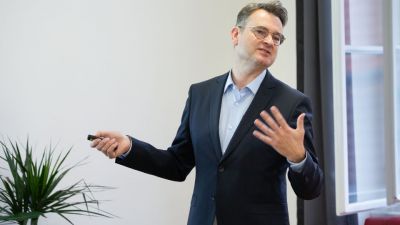Medici PRO Očkování (Med Students for Vaccination) is an initiative begun more than three years ago before anyone had heard of Covid-19. The pandemic has put the group front and centre. It’s aim is to provide the public with honest and factual information about why it’s important to get the jab – not just against the coronavirus but the usual suspects: measles, chickenpox, tetanus. Forum spoke to the organisation’s Jaromír Astl.

During repeated lockdowns in 2020, members of Medici PRO Očkování, like most of us, shifted their focus and communication online.
So if it wasn’t Covid, why was the initiative founded?
I am not a founding member but the primary reason Medici PRO Očkování (Med students for vaccines) was founded was in response to a decline in vaccination rates against measles and other diseases. We saw very little effort in this direction from the government and even from NGOs. As medical students, the original founders felt they could do something about it and contribute in a positive way – presenting facts about vaccines and about the diseases themselves in a way that was more digestible.
That was how things began and it became a project of both med students at the Second Faculty of Medicine at Charles University and of students of marketing and PR at the Faculty of Social Sciences, because we realised that vaccination and vaccine communication wasn’t only a medical topic but a communication one. We joined up and that is how the initiative got its current form: a new logo and a new, second phase.
How would you describe the approach? It comes across as friendly, non-aggressive – is that a fair characterisation?
I think so. The aim is not to make ‘foes’ of anyone who disagrees or has different opinions on the subject. For one thing, that is ineffective and you won’t breach any divide by cursing or making fun of someone. That is the opposite of what we want to do. We want to reach people who are sceptical of vaccines and don’t want to alienate anyone. That would be counterproductive and that’s not what we do.
The history of vaccine development and usage is itself fascinating – going all the way back to Edward Jenner in 1796, who made use of cowpox as a natural vaccine against the deadly smallpox. What is interesting is that the anti-vax movement is basically as old as vaccination itself: there were those who opposed vaccines practically from the beginning. What are some the reasons opposition formed – and not just in the past?
There are whole departments in some faculties whose main study is this subject because of the current pandemic and even one of our colleagues is studying the phenomenon at an academic level. But yes, the anti-vax movement indeed goes back to cowpox and there are caricatures from then that depict people as half-cows and the jokes – nowadays we would say memes – are eerily similar to the ones used by the anti-vax movement today. It has a long history.
The second big wave of opposition is linkable to a study on the correlation and causation of autism and vaccines in 1999 that was debunked many, many times and was taken down and retracted by The Lancet – which was a huge blow to that journal’s reputation. The author of the study, Andrew Wakefield, has since built up a celebrity image within the anti-vax movement and you could say that was really where the present-day opposition started.
First, it was autism and MMR vaccines and then it spilled over into other diseases and in past years even before the pandemic, in countries such as the US or France, the movement gained a lot of momentum. It has since been interlinked with the pseudoscience, conspiracy theory and the chemophobic or natural health scenes: all of these elements have combined into the modern anti-vaccine movement that received an additional “shot in the arm” from the current pandemic.
Do you think that it has become part of a culture war narrative? Certainly the social networks see a lot of people getting riled up, and in many ways the debate has become extremely emotional.
I wouldn’t say cultural war. Some people think that we have seen the emergence of different tribes that are pro- or anti- but I still think it is a generalisation that misses the finer points. For example, I don’t think the division splits even along a traditional Left/Right or lberal/conservative divide.
The anti-vax movement has really brought together a cohort of people from various backgrounds and various political beliefs. Anti-vax attitudes now tend to be attributed to the conservative movement but in the past it was attributed more to certain ethnic movements in the US, distrusting Big Pharma and so on. So it’s really, I think, a cross-cultural phenomenon that has slowly gone mainstream and that is the main danger. The social networks such as Facebook, with pro-scandal algorithms, laid fertile ground for this, but the discussion is also very common on Twitter.
You find strange bedfellows in one camp, who are anti-vaccine, but might not agree on a host of other issues.
They might not agree on a whole bunch of ideas but agree on this and they come from many different backgrounds but came to the same conclusion.
This is maybe flogging a dead horse, but one argument that is used ad nauseam to discredit the vaccines and to cast doubt on their safety, is to question the unprecedented speed with which they were developed. I get that mRNA is new, this was the first time it was used, I understand that people can be worried. Yet experts have explained countless times the how and why and that the companies took considerable risk in producing vaccines which could later have failed to be safe or effective. They stated repeatedly that safety was not compromised and explained the process. Yet still there is no convincing those opposed.
The argument questioning speedy development isn’t actually an argument, it’s an exercise in apologetics. It is part of a larger “snowball” and is just one of many “snowflakes” that form the core belief that vaccines are bad. This core belief might stem from various things: a fear of the unknown, a fear of big corporations... I wouldn’t say this is the reason for opposing vaccines, it is just one of many aspects.
The core belief might be a disbelief in the overall apparatus, in authority, in science, in the scientific community, and such belief is much deeper and much more complex. It is the reason that even though this myth around production has been addressed and even if it has been proven this fear is unsubstantiated, we still get feedback and comments from those who say “No thanks, we won’t change their minds.”
When Medici PRO Očkování began, there was a lot of outreach towards secondary schools. Has that changed, in part because of the lockdowns we went through, or is it still continuing, perhaps more online?
The online focus was always used but it is true that we had to focus more on online because of safety and restrictions that were in place. But we still try to reach schools as well as private companies who want to explain to their employees that a vaccinated workforce is safer and more reliable to work with. The focus is on vaccines and explaining what they are and why they are necessary.
You mentioned at the start that the initiative is a collaborative effort: what does each side bring to the table and what precedes hammering out a strategy?
The perspectives on the problem and how to best serve them are sometimes diverging: basically we have to balance scientific accuracy. We are not doctors, we do not give medical advice, some of us have finished their media studies but none of us have completed med school yet. But we curate current scientific knowledge in a digestible way. We need to be accurate but also accessible and that can be difficult and an art, really. We have to take the essence of an article but pare down the words while remaining accurate. Some context is removed so we have to agree on what information is essential and make sure we stay true to the message and the findings. So usually the medical people come up with the exact info, it can be an article, and the marketing students simplify or make the message more direct. Most of the time we agree.
Speaking of campaigns, I have followed some on the anti-vax side and much of the discourse there is about freedom above all else. What are your feelings about the “freedom” argument?
I don’t think the issue here is personal freedom but of collective responsibility and empathy. Because, we are all people and the appeal to quote-unquote personal freedom quietly pushes others away.
One campaign video I saw built rather effectively on the word “only” and slowly unravelled what I guess could be seen as a series of compromises that have grown more and more demanding over time. It’s “only a lockdown, it’s only two weeks. It’s only a mask, it’s only this or that,” with actors in the clip in the end building up to a crescendo when they begin tearing off masks. It makes the viewer feel like their freedom has been taken away and tries to tap into (some would say exploit) the exhaustion we all feel almost two years into the pandemic. What gets no mention, though, is that people are still getting sick, the virus has roared back and ICUs are filling up. Most of all, it offers no solutions: the situation evidently won’t be helped if everyone suddenly took off their masks and mingled like Covid never existed.
There is no question that the other side has their owned skilled media people and marketers, who are pushing a different message. What they often do, traditionally, is appeal to emotions and fear. Fear of losing freedom is one of their core arguments, so I am not surprised by that message at all.
As you mentioned, people in the anti-vax camp come from all walks of life. But perhaps most striking are scientists, doctors or researchers, some of them one foot over the line, some who have gone all in, who have lent credibility to the alternative narrative when it comes to vaccines. To me, it seems incredibly damaging.
They are definitely not helping their field but it is worth mentioning that not everyone who has a medical degree or a degree in the natural sciences is an “expert”. That’s the first thing, and the second, if you are an epidemiologist, virologist or medical practitioner who is positing theories that are not scientifically-backed, they are discrediting mainly themselves. We have what is known as scientific consensus and it represents the opinion of the majority of actual experts in the field. The overwhelming data speaks for itself.
I think that when it comes to the general public, it is those experts who ignore the overwhelming data who do the greatest harm.
It can be hard to distinguish between experts who are using the data to help and those who are using things for their own personal gain, whatever their motivations might be: to be more famous or something else… we will probably never know. But we disprove these experts with the same vigilance as any other conspiracy theorist on the internet. Because what they are saying is the same and their status doesn’t matter… They may have their own reasons (someone may be a shill, providing links to their e-shop where they offer all-natural remedies) but the moment they stop using science they stop being scientists. People don’t always see that because they still recognise the expert’s title.
Ultimately, do you think you can change peoples’ minds?
There are studies that suggest that between 10 – 15 percent of the populace are impossible to reach. Aiming the message at them would be a waste of resources and time. But not all people are the same: some who are sceptical or hesitant are open to dialogue and want to know more. We have seen, as the pandemic has worsened again, people again lining up to get the shot, so some are open to the idea and just need to know more.
| Jaromír Astl |
| Jaromír Astl is a first-year student of Marketing and PR at the Faculty of Social Sciences at Charles University. He writes for Markething.cz and is a member of their social media team. Besides his work in promoting vaccines, he volunteers as a guiding dog raiser and is an avid skier. |





















